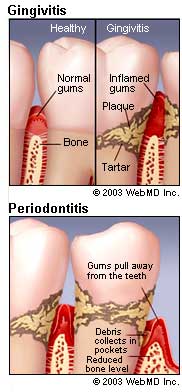 Periodontitis, or gum disease, is the number one cause of tooth loss in adults. Periodontitis has also been linked to cardiovascular disease, bacterial pneumonia and pregnancy complications.
Periodontitis, or gum disease, is the number one cause of tooth loss in adults. Periodontitis has also been linked to cardiovascular disease, bacterial pneumonia and pregnancy complications.
The American Academy of Periodontology states that periodontal diseases are serious bacterial infections. The toxins produced by the bacteria stimulate a chronic inflammatory response in which the body, in essence, turns on itself and the tissues that support the teeth are destroyed.
We offer a complete range of services to treat periodontal disorders. Early detection is the key to successful treatment, as the early stages of periodontal disease are often painless and you may not be aware that your gums are infected. We examine, not just screen, all patients on their first visit and annually thereafter and recommend a personalized course of treatment to arrest the disease and optimize your dental health.
For advanced stages of periodontal disease, we offer both surgical and non-surgical treatment to regenerate bone and gum tissue. Services range from scaling and root planing complimented by chemotherapeutic agents, to bone grafting and guided tissue regeneration.
Crown Lengthening
This common procedure involves the removal of gum tissue, bone or both to expose more of a tooth's structure. Crown lengthening is done when a tooth needs to be restored, but there is not enough tooth structure above the gum line to support a filling or a crown. This can happen when a tooth breaks off at the gum line, or a crown or filling falls out of a tooth that has extensive decay underneath.
Soft Tissue Grafts
Periodontal procedures are available to stop further dental problems and gum recession, and/or to improve the esthetics of your gum line.
Exposed tooth roots are the result of gum recession. Perhaps you wish to enhance your smile by covering one or more of these roots that make your teeth appear too long. Or, maybe you're not bothered by the appearance of these areas, but you cringe because the exposed roots are sensitive to hot or cold foods and liquids.
Your gums may have receded for a variety of reasons, including aggressive tooth brushing or periodontal disease. A soft tissue graft procedure will repair the defect and help to prevent additional recession and bone loss.
Guided Bone and Tissue Regeneration
A surgical procedure that utilizes barrier membranes to direct the growth of new bone and gingival tissue for proper function, esthetics or prosthetic restorations.
 Periodontitis, or gum disease, is the number one cause of tooth loss in adults. Periodontitis has also been linked to cardiovascular disease, bacterial pneumonia and pregnancy complications.
Periodontitis, or gum disease, is the number one cause of tooth loss in adults. Periodontitis has also been linked to cardiovascular disease, bacterial pneumonia and pregnancy complications.